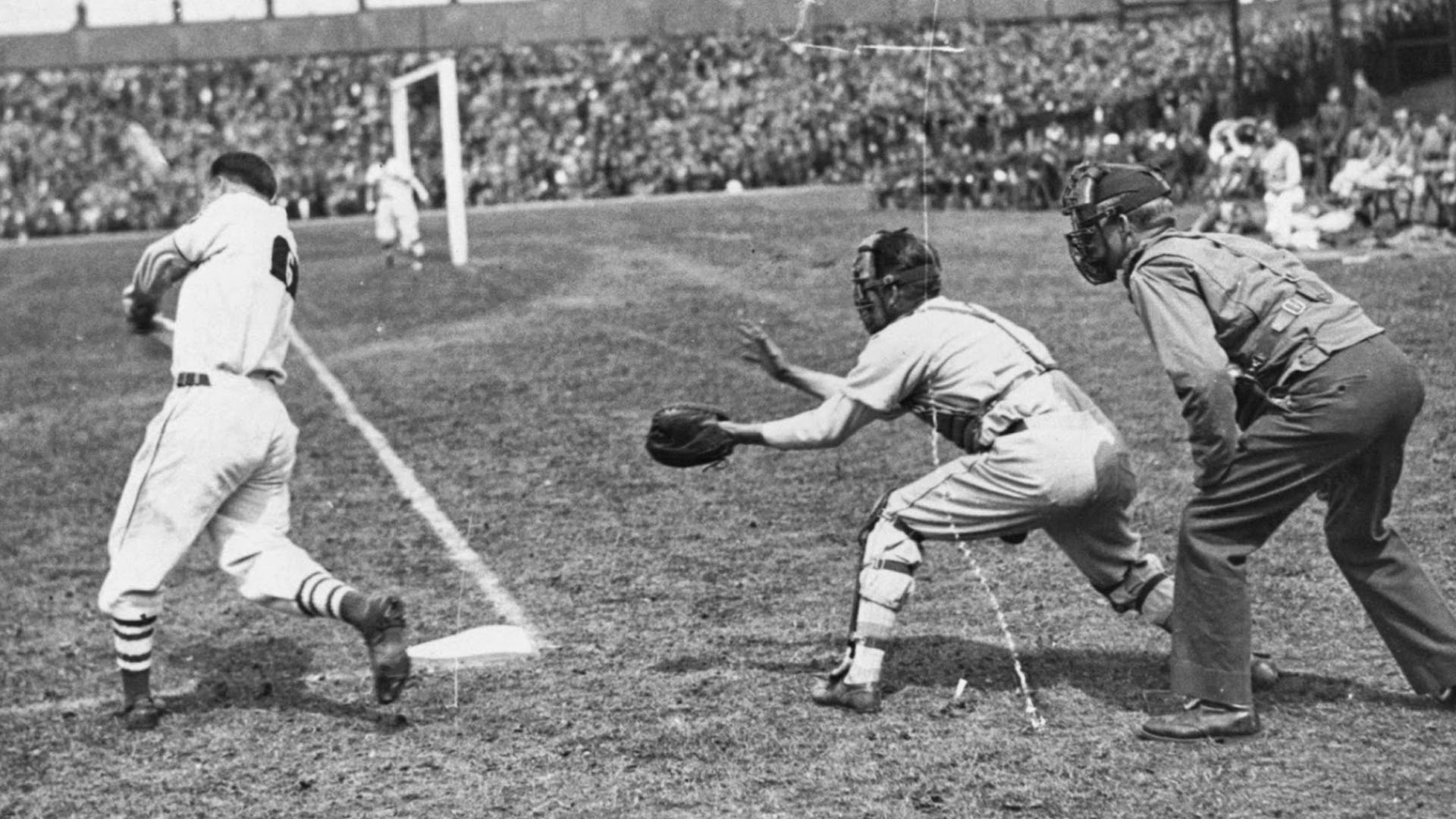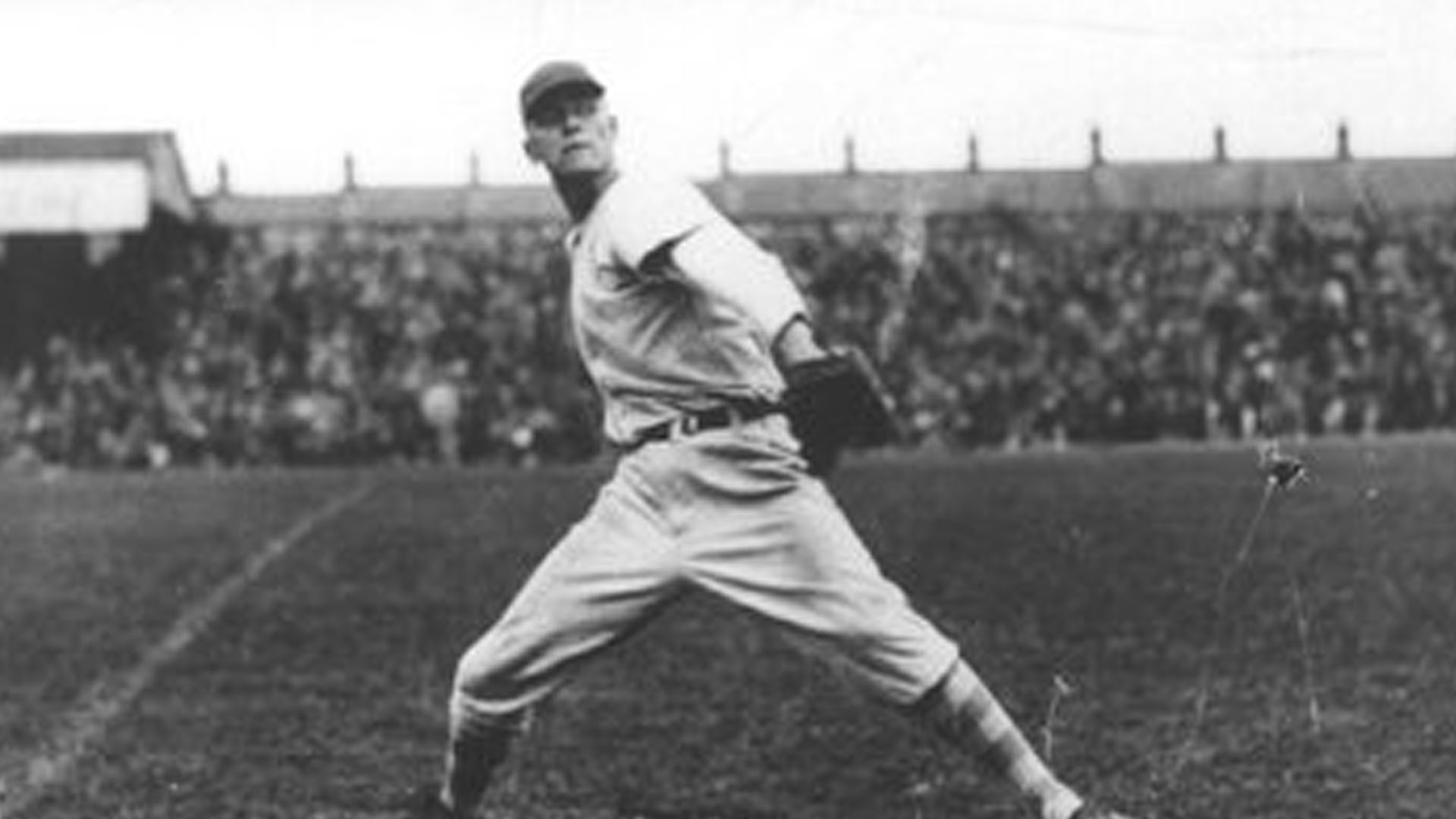By the end of 1942, more than 40,000 US servicemen had arrived in Northern Ireland. There are tales of GIs bringing bubblegum and nylon stockings across the Atlantic. They also brought baseball, one of their favourite sporting past times.
Some troops became homesick in rural Northern Ireland. Training regimes left the men tired and low in morale. A sporting programme seemed to be a good choice to improve matters. Troops took part in games of basketball, soccer, American Football, and boxing. It was baseball that seemed to boost the GIs morale most.
25th April 1942 – 2nd Battalion vs 3rd Battalion
The first recorded baseball game in Northern Ireland took place on Saturday 25th April 1942. The venue was Ravenhill Stadium, now known as Kingspan Stadium, home of Ulster Rugby. Major General Russell P Hartle, acting commander of the US Army’s Northern Ireland Force threw the first pitch of the game.
The typical Belfast weather was overcast and windy. 2nd Battalion took on 3rd Battalion of the 133rd Infantry Regiment, 34th Infantry Division. Neither team had baseball uniforms and the field in Belfast had no backstop or pitcher’s mound.
Around 1,000 locals turned out to watch the game. A public address system offered them a play-by-play commentary. The spectacle also featured a concert from the regimental band and a jitterbug demonstration on the sidelines. 3rd Battalion ran out 14-4 winners. Corporal Leo J Robinson became the first serviceman to hit a home-run in Europe during World War Two.
4th July 1942 – 34th Infantry vs 1st Armored Division
The first officially recognised game of World War Two in Northern Ireland took place on 4th July 1942. This time the venue was Windsor Park, now the National Football Stadium. The event was part of an Anglo-American Independence Day celebration.
The “Midwest Giants” represented 34th Infantry Division. A team of “Kentucky Wildcats” lined up for 1st Armored Division. A pre-game press cutting named most of the team from the southern states. Due to the nature of army logistics, most of the Wildcats lineup came from New York State and the east coast.
The Midwest Giants
| Rank | First Name(s) | Last Name | City | Position |
|---|---|---|---|---|
| Sergeant | Robert | Lange | Wilton Junction, Iowa | Pitcher |
| Private | Vernon | Kohler | Cincinnati, Ohio | Pitcher |
| Corporal | Donald | Shelton | Webster City, Iowa | Pitcher |
| Private First Class | Orlando | Langenfeld | Earling, Iowa | Catcher |
| Private | John | Hetcher | Yonkers, New York | Catcher |
| Private | Harold | Flood | Cedar Rapids, Iowa | First Base |
| Sergeant | Erwin | Gangnath | Minneapolis, Minnesota | First Base |
| Private | Victor | Saltzgaver | Kansas City, Missouri | Second Base |
| Private | Lester | Zabel | Davenport, Iowa | Second Base |
| Private | Daniel | Leninger | Minneapolis, Minnesota | Third Base |
| Private | Richard | Olliges | St Louis, Missouri | Third Base |
| Private | George | Zwilling | Cincinnati, Ohio | Short Stop |
| Sergeant | George | Luke | Dubuque, Iowa | Short Stop |
| Private | Francis | Tofanelli | Davenport, Iowa | Left Fielder |
| Private | Wayne | Gaddis | Waterloo, Iowa | Left Fielder |
| Private | Edward | Orgell | Eldora, Iowa | Center Fielder |
| Sergeant | Robert | Burns | LeMars, Iowa | Center Fielder |
| Private | John | Rooney | Elgin, Iowa | Right Fielder |
| Private | Leo | Robinson | Harper's Ferry, Iowa | Right Fielder |
The Kentucky Wildcats
| Rank | First Name(s) | Last Name | City | Position |
|---|---|---|---|---|
| Private | Troy | Needham | Scranton, Arkansas | Pitcher |
| Private | Paul | Down | Livingston, New Jersy | First Base |
| Corporal | Ed | Hector | Orange, New Jersey | Second Base |
| Private | John | Kratochwil | Long Island, New York | Third Base |
| Private | Tom | Cassidy | New York, New York | Short Stop |
| Private | Sheldon | Bowen | Harrisville, New York | Center Fielder |
| Sergeant | Laurence | Cruise | Covington, Kentucky | Right Fielder |
The Giants and Wildcats game took place in front of an enthusiastic crowd of around 7,500. The audience included the Duke and Duchess of Abercorn, and Prime Minister John W Andrews. Other members of the Northern Ireland government were also in attendance. The Duke of Abercorn would become a regular attendee at games over the next couple of years.
For many in Northern Ireland, it was a first ever experience of the great American past-time. The American press reported on the game in Stars and Stripes magazine on 11th July 1942.
The game became a pitchers’ battle with a mix of sublime and sloppy fielding. Intelligent base running led to the scores. Sheldon Bowen and John Kratochwil scored in the third inning to give the Wildcats a 2-0 lead.
Going into the last half of the eighth inning, the Giants trailed by 2-1. Their coach substituted the entire team. The new lineup took the game by the scruff of the neck. Two more scores and great pitching from Donald Shelton saw the Midwest Giants take a 3-2 win.
The association football stadium at Windsor Park was unsuitable for baseball. For a start, there was no pitchers’ mound. A soccer goalpost also blocked the path to first base. Spectators gathered too close to the game for their own safety but the event was a success for the public and the military. Many further games would follow.
25th July 1942 – 34th Infantry vs 1st Armored Division
Both sides faced each other again on 25th July 1942 to raise money for the Belfast Hospital for Sick Children and the Ulster Hospital for Children and Women. The Midwest Giants (34th Infantry Division) won the second game 9-6. The press highlighted Vernon Kohler’s “wobbly” pitching.
22nd May 1943 – US Army Quartermaster Agitators v Medical Corps Pill Rollers
The 22nd May 1943 was opening day of the season for the 12 team Belfast League. Captain Frank B Willis, Chairman of the League organised an entire day of entertainment. This featured a game at Ravenhill Stadium between the US Army Quartermasters and the Medical Corps after a military parade.
After six innings, the Agitators led the Pill Rollers 4-3 when the heavens opened. A real Northern Irish downpour ended the day’s proceedings. Such weather problems were familiar to the Americans by 1943. One GI claimed:
If you can see the Mountains of Mourne, it’s going to rain and if you can’t see them, it’s already raining!
The league continued through the summer. Record-breaking performances from 26-year-old pitcher Ed Behnen gave US Army Headquarters an advantage.
Another of the teams to beat in 1943 came from the US Navy Base in Derry~Londonderry. As well as playing in the Belfast League, the rapid expansion of facilities on the north coast meant they had their own league.
This Naval Base League included the Navy Sea Bees, Naval Hospital, and the Beech Hill Marine Corps. The Marines won the league in September 1943.
18th May 1944 – Beech Hill Marines v Lisahally Supply Team
By 1944, most of the US Army contingent had left Northern Ireland for Europe or North Africa. A heavy naval presence on the Atlantic coast meant that baseball continued there for the rest of the summer.
On the opening day, the Beech Hill Marine Corps crushed their Lisahally opponents. 16-0 was the final score. The Marines went on to dominate the entire season and retaining their Naval Base League title.
Baseball in Wartime
The game of baseball came close to shutting down during the war. In 1942, Kenesaw Mountain Landis, National Commissioner for Baseball wrote to President Roosevelt. Should baseball cease for the duration of World War Two? Roosevelt responded with a “green light letter” stating the game was good for the nation’s morale.
Around 90% of professional players from the 1941 season took part in the war. Serving troops included Hall of Famers Bob Feller, Hank Greenberg, Joe DiMaggio, and Ted Williams.
Since these rare games during World War Two, there hasn’t been a great amount of baseball played in Northern Ireland. Currently, the sport is represented by Ulster Baseball, Ulster Buccaneers, and Belfast Northstars playing in an Irish-wide league. The country now has more facilities better suited to the game than the stadia of yesteryear.
If you remember watching the US GIs playing baseball or American Football in Northern Ireland, we would love to hear your stories.

